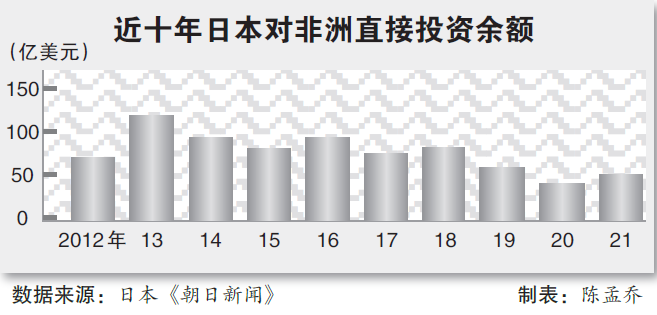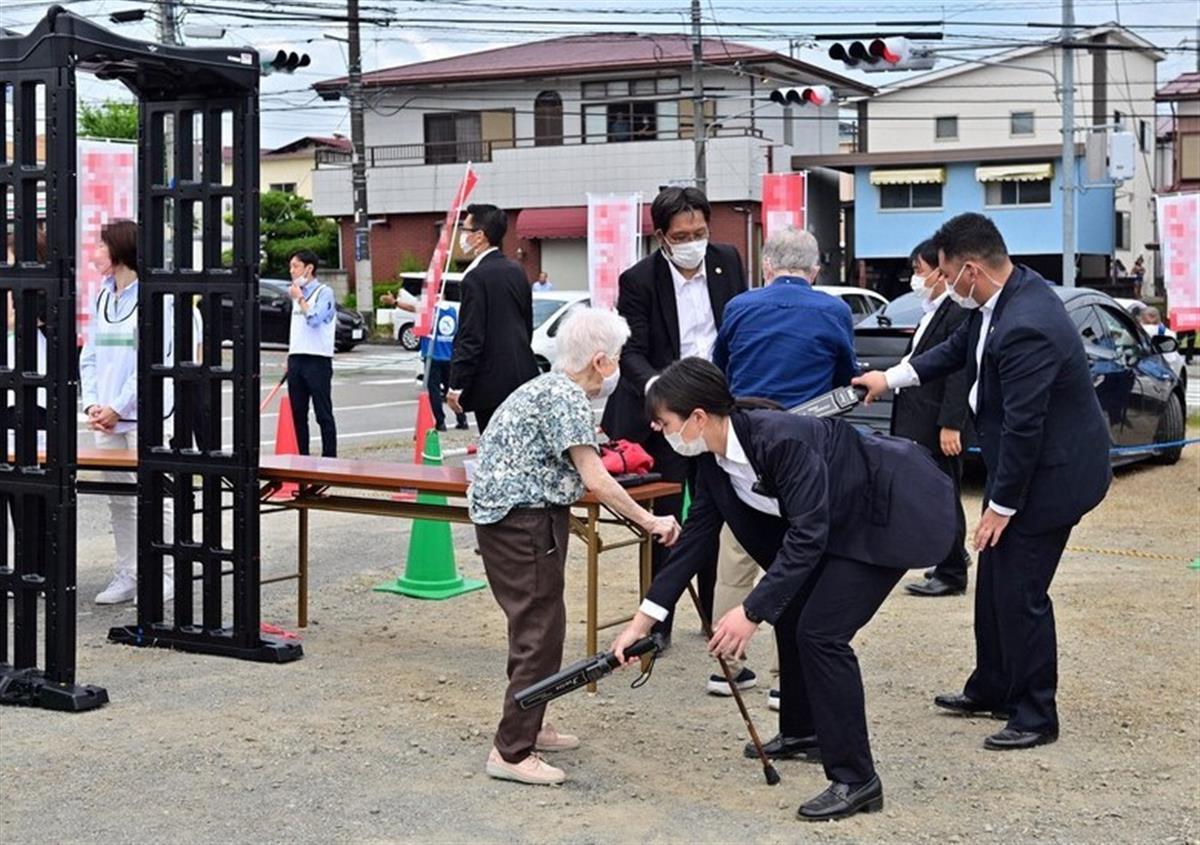Japan's "developing Africa" to contain China, and the practice "makes most African countries feel tired"
Author:Global Times Time:2022.08.28
[Global Times Special Reporter Zou Song Global Times Special reporter Chen Yan] The 8th African Development Conference (TICAD) led by Japan will be held in Tunisia, North Africa from 27 to 28 this month. A number of Japanese governments have revealed that Kishida Wento, who is suffering from new crown pneumonia, will attend the meeting through online videos and announce that it will help Africa to train 300,000 talents and other measures to "fight against China in Africa." Africa is a large market, and many countries are open -minded here, but countries like Japan who targets "fight against China" rather than cooperative development as the goal are rare. Although the Japanese side aims at China and is ready to throw a series of so -called "heavy" investment measures for Africa, the number of participants in this meeting is expected to decrease and the scale will be reduced. Many people in Japan are worried that "the brand of TICAD will be lost." Some analysts said that the deepening reason for the decline in TICAD's influence is that Japan's investment and personnel exchanges with Africa are gradually decreasing. Japan follows the US diplomatic strategy, regards China as a false enemy, and regards Africa as a game of games. Political terms have been tired of most African countries.
Japan's calculation
The "Japan today" website reported on the 25th that "Japan promised to invest in Africa in Africa to fight against China". At the African Development Conference held in Tunisia on the 27th, Kishida will announce online to help local agriculture and agriculture and agriculture and In the field of medical and health, 300,000 talents are cultivated. This is aimed at supporting the quality improvement of African economic growth through talent investment and ensuring sustainability, showing different from China.
In fact, the Japanese media cooperated with the government for a long time to emphasize the investment in Africa "different from China" to help Japanese companies find investment opportunities. The author saw that one of the most circulated newspapers "Asahi Shimbun" in Japan. In order to cooperate with the government's call to invest in Africa, he deliberately made serial articles in Africa. It talked about the resources such as African non -ferrous metal cobalt. He hoped that enterprises would develop.
Although the Japanese media shouted for the government, Japan was very confused about whether it was able to invest in Africa and fight against China. As early as May, at a meeting of the Japanese Economic Group Federation, Hirano Keli, chief researcher of the Asian Institute of Economics, Institute of Economics, the Japanese Trade Revitalization Institute, said publicly, "The situation of the epidemic and Ukraine is so unclear. As the host country, Tunisia has great expectations for Japan. We should continue to host the future of African economy. " Hirano has euphemistically mentioned that Japan has passed the highest point in non -investment, and it is not easy to maintain previous investment. The opportunity for additional investment is not great. But for the purpose of competing with other countries, it is called on Japanese companies to continue to invest in Africa.
The Japanese government's appeal and the cooperation of the media have shown a trend opposite to non -investment scale in Japan. According to the data released by the Asahi Shimbun, Japan's investment in Africa was the highest in 2013, with more than $ 10 billion in that year, and then began to decline. By 2020 Small (pictured).

Used cars, high -end color TV and sushi rolls
The African side has not responded to the Japanese conference, and many media have reportedly reported the purpose of Japan's investment in Africa. The "North African Post" recently reported that the meeting will give Japan an opportunity, allowing Japan and African relations to return to the right track after the epidemic turbulence and former Prime Minister Shinzo Abe. In the past, Tokyo had influenced the African continent through soft power, assistance and development projects, while private sector and commercial banks were more cautious. However, in the context of the dual impact of the epidemic and the Russian conflict on the global economy, in the face of the highly highly high economic participation in Africa in Africa in the face of geopolitics, Tokyo hopes to re -promote its private sector to invest in Africa and provide the African continent loan.
The Global Times reporter found in an interview with many countries in Africa that although "Japanese elements" are not uncommon in Africa, they are basically concentrated in second -hand cars, high -end color TVs and sushi rolls. Mozambique driver Paul told reporters that the preservation rate of Japanese cars is very high, and African countries are generally not rich. Japanese used cars have mature supply and marketing channels in Africa. Japanese. In the field of household appliances, Japan's "position" has been reduced to Sony, Panasonic, and high -end models of several audio brands. Even in South Africa, which is relatively developed, the highest home appliance market share is also Chinese brands such as Hisense. In addition, in Africa, sushi is the "Chinese food" with the highest acceptance. Many local restaurants hanging on "Chinese food" signatures are actually sushi. The reporter once inquired about the original committee. I learned it after one afternoon. "
Mr. Wu, who has been in business in South Africa for nearly 20 years, is very touching with Japanese companies in Africa. He told the Global Times reporter that Japanese companies entered Africa from the 1960s, especially in South Africa and North Africa, with relatively high economic development, but have been going downhill in the past 20 years. Mr. Wu has participated in the agency of several Japanese medical device companies in South Africa, but it was more than ten years ago. Nowadays, this type of Japanese company is basically not seen in South Africa. Only the specialty stores of Japanese car companies are still there, but it has also been violently impacted by Korean car companies. In recent years, Chinese auto brands have also increased in South Africa.
When it comes to competition with China, Mr. Wu's outstanding feelings are the "nationality" problem. He feels that the Japanese rarely fight for Africa alone. Japanese employees in Africa are basically a large company migrant worker, and the African countries and the African countries and the African countries and Africans have no sense of identity. In contrast, China or South Korea and India have many small and medium -sized private companies working hard in Africa to participate in various development in Africa. "This kind of contact with people is very important. Africans need real friends instead of only treating Africa as a place to make money." Mr. Wu emphasized. Japanese practice "makes most African countries tired"
Uganda's "Independence" analyzed on the 24th that Japanese companies lack their understanding of the African continent, and most companies continue to focus on markets closer to home. The number of Japanese companies operating in Africa slowly increased from 520 in 2010 to 796 in 2019, but due to the epidemic, total investment has declined in recent years.
The "2022 World Investment Report" released by the United Nations Trade and Development Conference showed that in 2021, FDI (foreign direct investment) of African countries reached a record 83 billion US dollars. Britain (US $ 65 billion) and France (US $ 60 billion) investors. According to data released by the Ministry of Commerce of China, as of the end of 2020, China has exceeded 43.4 billion US dollars in Africa and has invested in more than 50 African countries.
"Japan and China cannot compete in Africa at all!" Tanaka Kenji, the chairman of the Pacific Forum of Japan, told the author that from the figure he currently obtained, Japan only stayed in thousands of people in Africa. Japan has done a lot of work in Africa since the 1960s, but after the expansion and deceleration of the country's economic scale, the scope of expanding abroad is limited. Tanaka believes that China has always cared about Africa, and has a lot of room for cooperation between China and Japan, but from the statement of Japanese politicians, "the attitude of competing with China is stronger." In terms of enterprises, Tanaka believes that the number of people can send to Africa is limited, and Japanese capital has also entered the bottleneck of investing in Africa. At this time, cooperation with China should be the best opportunity, but there are not many cooperation between enterprises.
The editor -in -chief of South Africa's "Diplomacy" magazine, Kritan Bahanana, said that Japan has the willingness to increase Africa in Africa, and his willingness must be transformed into reality and effectively benefit the people in Africa. From the perspective of Japan's foreign policy in recent decades, Africa has not become Japan's priority, which is consistent with Japan's trend of US diplomatic strategy. Earlier, Japan also participated in non -investment through financial institutions, but it was often accompanied by Western -style "additional conditions". This "passive aid" method has made most African countries tired.
- END -
Japanese Prime Minister Kishida Yamashi Yamana Prefecture gave a speech, and the on -site alert was strict

Jimu Journalist Hu LiIntern Wen JiaruBased on Japanese media reports, at 11 am loc...
A car accident in a passenger bus in Zaber, Afghanistan, causing 4 deaths and 48 injuries
On July 26, an official of Afghanistan said that a passenger bus in Zabur province had an accident during the turning, causing 4 passengers to die and 48 other injuries.The official who was unwilling